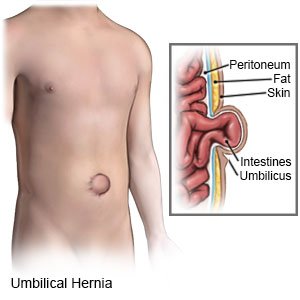Umbilical Hernia
Medically reviewed by Drugs.com. Last updated on Sep 23, 2025.
AMBULATORY CARE:
An umbilical hernia
is a bulge through the abdominal wall near your umbilicus (belly button). The hernia may contain tissue from the abdomen, part of an organ (such as the intestine), or fluid.
 |
Signs and symptoms:
Umbilical hernias usually do not cause pain. Your hernia may disappear when you lay flat. You may have any of the following:
- A soft bulge or swelling in or near your belly button
- A bulge that gets bigger when you cough, strain to have a bowel movement, or sit up
- Nausea or vomiting
- Constipation
Seek care immediately if:
- Your hernia gets bigger, feels firm, or turns blue or purple.
- You have severe abdominal pain with nausea or vomiting.
- Your abdomen is larger than usual.
- You are unable to have a bowel movement or pass gas.
- You see blood in your bowel movement.
Call your doctor or gastroenterologist if:
- You have a fever.
- You have nausea or are vomiting.
- You are constipated.
- You have questions or concerns about your condition or care.
Treatment for an umbilical hernia
depends on the size of your hernia or symptoms it causes. You may need any of the following:
- Watchful waiting may be recommended if your hernia is small and not painful. This means you do not need immediate treatment, but you have regular exams to check for changes. If your hernia becomes larger or painful during watchful waiting, your provider may recommend surgery.
- Manual reduction of your hernia may be needed. Manual reduction means your healthcare provider uses his or her hands to put firm, steady pressure on your hernia. Pressure is applied until the hernia disappears inside your abdominal wall.
- Surgery is usually done to place the hernia back inside the abdominal wall. You may need surgery if the hernia stops blood flow to any of your organs. You may also need surgery if your intestines or an organ get trapped inside the hernia.
Self-care:
- Drink liquids as directed. Liquids may prevent constipation and straining during a bowel movement. Ask how much liquid to drink each day and which liquids are best for you.
- Do not lift heavy objects. This can increase pressure on your abdominal muscles and make your hernia bigger or cause another hernia.
- Eat foods high in fiber. Fiber may prevent constipation and straining during a bowel movement. Foods that contain fiber include fruits, vegetables, beans, lentils, and whole grains.

- Do not put pressure on your hernia. Do not push on the hernia or place tape or a coin over it.
- Maintain a healthy weight. If your body weight is higher than recommended, weight loss may help relieve your symptoms. Your healthcare provider will tell you what a healthy weight is for you. Your provider can help you create a safe weight loss plan, if needed.
- Do not smoke. Nicotine and other chemicals in cigarettes and cigars can weaken the abdominal wall. This may increase your risk for another hernia. Ask your provider for information if you currently smoke and need help to quit. E-cigarettes or smokeless tobacco still contain nicotine. Talk to your provider before you use these products.
Follow up with your doctor or gastroenterologist as directed:
You may need to see a surgeon to plan for hernia repair. Write down your questions so you remember to ask them during your visits.
© Copyright Merative 2025 Information is for End User's use only and may not be sold, redistributed or otherwise used for commercial purposes.
The above information is an educational aid only. It is not intended as medical advice for individual conditions or treatments. Talk to your doctor, nurse or pharmacist before following any medical regimen to see if it is safe and effective for you.
Learn more about Umbilical Hernia
Treatment options
Care guides
Symptoms and treatments
Further information
Always consult your healthcare provider to ensure the information displayed on this page applies to your personal circumstances.
